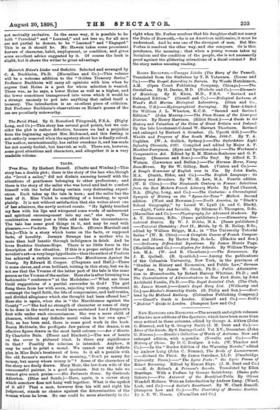MUM.
Trite Blue. By Herbert Russell. (Cbatto and Windus.)—This story has a double plot ; there is the story of the lass who, though she "loved a sailor," did not disdain amusing herself with the attentions of gentlemen belonging to other professions; and there is the story of the sailor who was loved and had to comfort himself with the belief during certain very distressing experi- ences. Each takes up the tale in turn ; and the sailor has the best of it. Miss Violet is something of a humbug, to speak plainly. It is not without satisfaction that she writes about one of her admirers, the newly arrived curate. "He lightly touched my face with his lips and whispered some words of endearment and spiritual encouragement into my ear," she says. The combination seems just a little odd under the circumstances. The tale has some good things in it, and may be read with pleasure.— Vindicta. By Fenn March. (Horace Marshall and Son.)—This is a story which turns on the facts, or supposed facts, of heredity. Jermyn Strange has a mother who is more than half lunatic through indulgence in drink. And he loves Beatrice Graham-Hope. There is no little force in the description of the situation. If this is a proper subject for the novelist's art—a very large hypothesis—then the author of Vindicta has achieved a certain success.—The Marchioness Against the County. By Edward H. Cooper. (Chapman and Hall.)—There is some clever, and even brilliant, writing in this story, but we do not see that the Yvonne of the latter part of the tale is the same person as the Yvonne of the earlier. Here she is after listening to a fashionable " conference " at the Madeleine :—" What are these timid suggestions of a partial surrender to God ? The girl flung them from her with scorn, rejecting with young, vehement contempt the tepid faith, the life of compromises, and half-truths, and divided allegiance which she thought had been offered her." Here she is again, when she is "the Marchioness against the County" :—" She had no strength of character or sense of duty to be done in the world as would have sustained Lord Draycott's first wife under such circumstances. She was a mere child of pleasure, without any definite moral value in her own eyes." But, as has been said, there is some good work in the book. Baron Mathurin, the profligate Jew patron of the drama, is an effective figure drawn in the most lurid colours.—Ace o' Hearts. By Charlotte Bain. (Hurst and Blackett.)—The ace of hearts on the cover is pictured black. Is there any significance in that ? Possibly the solecism is intended. Anyhow, it may be used to point a moral. We cannot see any definite plan in Miss Bain's treatment of love. Is it all a parable with the old farmer's maxim for its meaning, "Don't ye marry for money, but marry where money is " ? Some of the characters of the story are finely drawn. Mary Muir, the low-born wife of the unsuccessful painter, is a good specimen. But to the tale we cannot give much praise.—His Fortunate Grace. By Gertrude Atherton. (Bliss and Sands.)—Here, again, is a clever story which somehow does not hang well together. What is the upshot of it all ? That a man, however firm his will and right his judgment, stands no chance against the determination of the woman whom he loves. No one could be more absolutely in the
right when Mr. Forbes resolves that his daughter shall not marry the Duke of Bosworth,—he is an American millionaire, it must be understood. And he was one of the strongest of men. But Mrs. Forbes is resolved the other way, and she conquers. Or is this, perchance, the meaning : that when a young woman takes uF Socialism and the condition of the people, she is not necessarily proof against the glittering attractions of a ducal coronet ? But the story makes amusing reading.


































 Previous page
Previous page